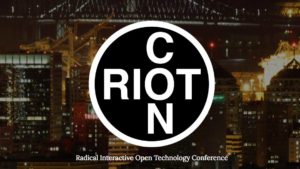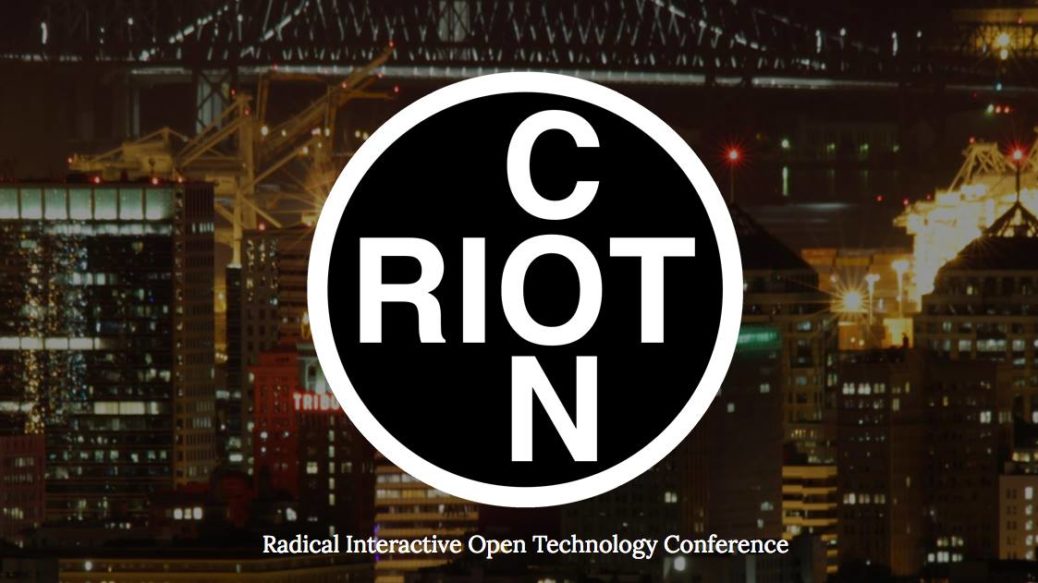
RIOTcon (Radical Interactive Open Technology Conference) is a new conference seeking to highlight the intersections between radicalism, art, and technology. Hosted in Oakland, CA
SCHEDULE
11 am
Main Room:
Advanced Tactics for Guerrilla Eco Street Art By Kasey Smith
Telegraph Room:
Hackerspace and The need for community By Mitch Altman
12 pm
Main Room:
Building a Better Opposition: The Pursuance System and the Second Wave of Online Resistance By Steve Phillips
Telegraph Room:
Free Crack Pipes For Better Public Health Outcomes By Maggie Mayhem
1pm:
Main Room:
Audience Choice Lighting Talks
Have a talk you didn’t get to submit but still want to talk? Come to this talk to let the audience decide what they want to hear. 15 minutes each.
Telegraph Room:
A History of Fire in California’s Ecosystems By Natalie Wilkinson
2pm:
Main Room:
F[oia] the Police by Freddy Martinez
Telegraph Room:
Fighting Cyber Dystopia with Tech Solidarity and the Digital Commons By Mai Ishikawa Sutton
3pm:
Main Room:
Internet Art, Aesthetics, and Activism By Jeff Ray
Telegraph Room:
Using the blockchain to create a token backed by a land trust by Josh Wolf
TALK SUMMARIES
Advanced Tactics for Guerrilla Eco Street Art By Kasey Smith
Generally, guerrilla gardening is employed to support a narrow range of social causes. How can we borrow from their toolkit to expand our tactics and augment other forms of protest art? We’ll cover the basics, delve into some underutilized tactics, and ideate on additional implementations.
Hackerspace and the need for community by Mitch Altman
The hackerspace movement has grown as big as it has because of the need for community. Community takes a lot of effort, yet the benefits are incredibly rewarding. This talk covers these and other aspects of creating effective communities.
Building a Better Opposition: The Pursuance System and the Second Wave of Online Resistance By Steve Phillips
Our free, open source, and secure Pursuance System software enables participants to: create action-oriented groups called “pursuances”, discuss how best to achieve their mission, rapidly record exciting strategies and ideas in an actionable form (namely as tasks), divvy up those tasks among one other, share files and documents, get summoned when relevant events occur (e.g., when they are assigned a task, or when mentioned), request help from others, receive social recognition for their contributions, and to delegate tasks to other pursuances in this ecosystem in order to harness its collective intelligence, passion, and expertise.
Pursuance can be used for a great many things. But we, its creators, have certain interests. Specifically, we are focused on organizing activists, journalists, and non-profits in order to solve serious problems we face as a society — the surveillance state, the police state, the drug war, and many more.
Free Crack Pipes For Better Public Health Outcomes By Maggie Mayhem
Although controversial, harm reduction strategies have been proven to be successful in reducing infection and negative health outcomes among substance users. The benefits of needle exchanges are numerous: people are tested for HIV and Hep C and linked to care if needed, fewer discarded needles are found in public spaces, people are trained on how to prevent overdoses and what to do if someone is experiencing one, wound care is available, and case management and support is offered. Most of all, infections are prevented by providing people with the clean supplies they need so they aren’t reliant on sharing or re-using equipment.
Although many cities begrudgingly accept the benefits of syringe access programs, providing similar resources to crack cocaine and methamphetamine users is almost uniformly forbidden even in some of the most progressive cities due to stigma and fear of substance users. The risks associated with smoking increase when substance users share pipes, especially when the glass is broken or mouth wounds from burns are present. Given that pipes are classified as drug paraphernalia, they can be difficult to access and costly to carry so ad hoc pipes are made from unsafe materials such as broken light bulbs and discarded trash. This presentation will outline why safer smoking supplies are needed, how they work, and what you can do to support them.
A History of Fire in California’s Ecosystems
By
Natalie Wilkinson presents historical context of fire in California’s ecosystems utilizing several texts by experts such as Neil Sugihara, Stephen Pyne, and Raymond Clar. An analysis of the history of fire practices of the Native American Era and how they changed during colonization up until present practices, will address governor Jerry Browns statement, that the state faces a “new normal” of fire risk exacerbated by climate change. The talk will end with a discussion about steps forward; what should be expected from our national resource agencies after such a catastrophic fire season.
F[oia] the Police by Freddy Martinez
F[OIA] the Police is a high-level overview of different techniques used when sending Freedom of Information Act (FOIA) requests to police departments in the United States. The talk tells the story over the last two years of using public record to inform activism, drive journalism, and help change laws. FOIA laws, like all systems, can be hacked and worked around using creative tricks, some of which this talk will highlight. Finally we will address the need for democratizing this internal knowledge and spreading it throughout civil society.
Fighting Cyber Dystopia with Tech Solidarity and the Digital Commons By Mai Ishikawa Sutton
These days it seems impossible to go a week without news of a major scandal involving a large, networked computing platform. Infamous stories include Google image search algorithms that return racist and sexist results to users, or Twitter’s repeated failure to moderate aggressive trolling and systematic intimidation that aim to silence marginalized voices. Why do many tech companies neglect to address (or foresee) such glaring problems with their user platforms, even despite good intentions? What does a different approach to technological innovation look like?
This talk will explore some recent trends and innovations within the tech solidarity movement, such as platform cooperativism and digital commoning projects. It will explain how they may offer an alternative to the dominant model of profit-fueled tech development — projects and enterprises that instead center equity, diversity, and democratic control by design. It will end with ideas on how technologists and artists can help bolster this movement to democratize control over our internet infrastructure.
Internet Art, Aesthetics, and Activism By Jeff Ray
In this lecture and visual presentation, we will be exploring current and past internet art and artists including the political collage animations of Ken Tin Hung, the digital interventionist work of Paolo Cirio, and the computer game manipulation of Jodi (art collective). We will talk about the genre as a whole and its capacity to be one of the most political of all art genres. We will discuss some of the tools to create this kind of work including open source, inexpensive software tools and various other resources including Bay Area classes and organizations. There will be a 15-minute questions and answers period at the end of the presentation. My artist website is jeffrayarts.com.
Bio: Jeff Ray is an artist, musician, digital arts instructor, and arts activist. He is currently teaching net art and web design at Cal State University San Marcos. He recently taught Game Art at the University of Nevada, Reno, and in the past has taught sound art and conceptual information arts at San Francisco State University. He currently helps develop the programming and artist outreach at Escondido’s “A Ship In The Woods” art gallery.
Using the blockchain to create a token backed by a land trust by josh wolf
While much of the attraction to cryptocurrency is its ethereal nature, is it possible to apply the technology to build a real-world intentional community that relies on a new form of cryptocoin as its primary currency? A round-table discussion.

